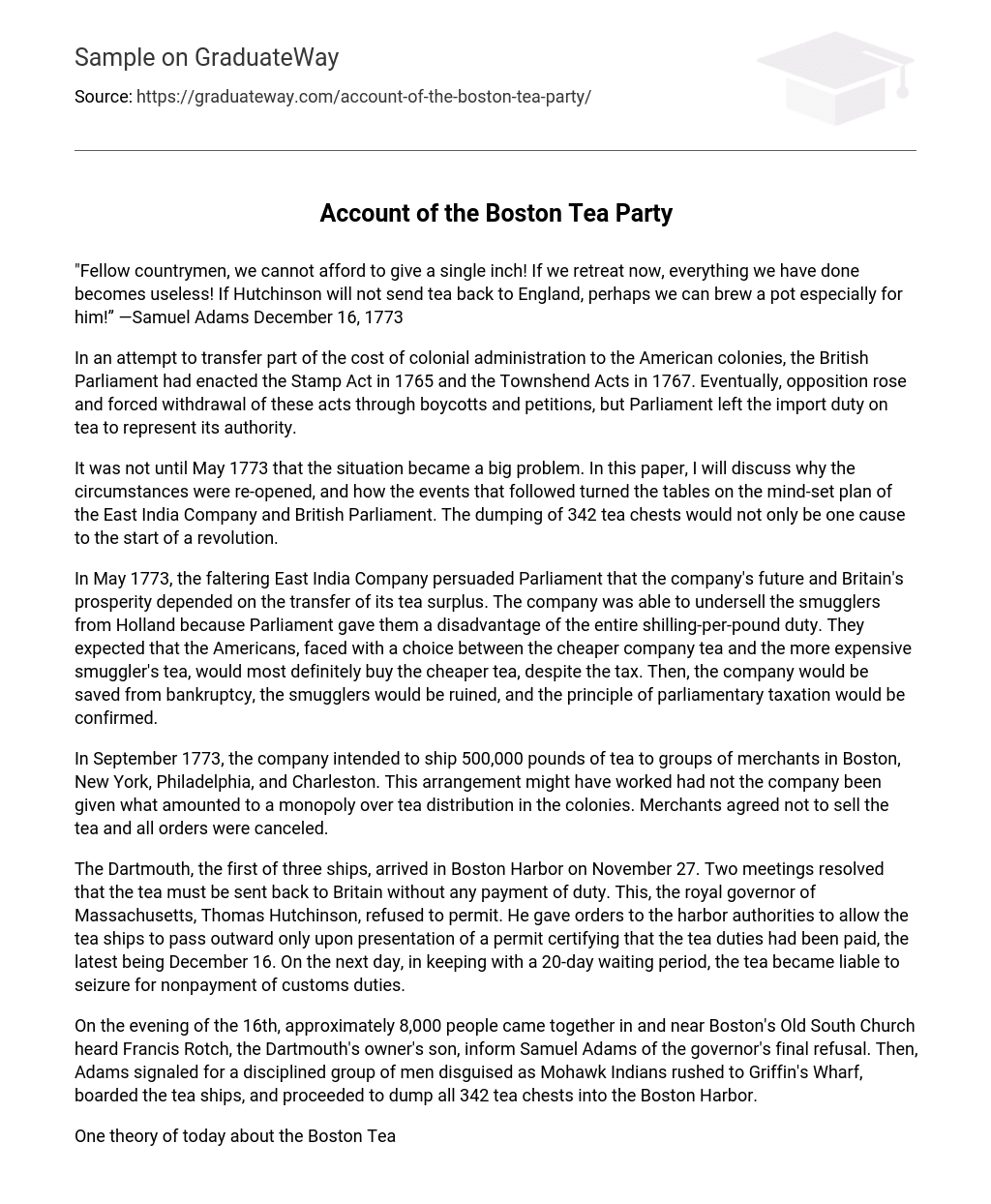“My fellow countrymen, we must not surrender under any circumstances! If we withdraw now, all our hard work will be wasted! In the event that Hutchinson declines to send back the tea to England, perhaps we can prepare a unique tea solely for him!” — Samuel Adams December 16, 1773
The Stamp Act was passed by the British Parliament in 1765 to transfer some of the colonial administration costs to the American colonies. Soon after, in 1767, the Townshend Acts were also implemented for this purpose. However, as resistance against these acts grew, boycotts and petitions led to their eventual overturning. Nevertheless, Parliament chose to maintain the import duty on tea as a display of its authority.
In May 1773, the situation became a significant problem that will be discussed in this paper. It will explore the reasons behind the re-opening of the circumstances and how subsequent events challenged the plans of the East India Company and British Parliament. The revolution’s inception cannot solely be attributed to the dumping of 342 tea chests.
In May 1773, Parliament was convinced by the struggling East India Company that its tea surplus needed to be transferred for the sake of the company’s future and Britain’s prosperity. The advantage given to the company was the entire shilling-per-pound duty, which disadvantaged smugglers from Holland. The expectation was that Americans would choose the cheaper company tea over the more expensive smuggler’s tea, despite the imposed tax. This choice would save the company from bankruptcy, ruin the smugglers, and confirm the principle of parliamentary taxation.
In September 1773, the company planned to deliver 500,000 pounds of tea to merchants in four cities: Boston, New York, Philadelphia, and Charleston. However, as the company monopolized tea distribution in the colonies, the merchants collectively chose not to sell it. Consequently, all orders were canceled.
The Dartmouth, the first ship, arrived at Boston Harbor on November 27. Two meetings concluded that the tea should be sent back to Britain without duty payment. However, Governor Thomas Hutchinson of Massachusetts rejected this proposal. He directed the harbor authorities to permit only those tea ships that could show proof of paid duties to depart. The deadline for obtaining this permit was December 16. If the customs duties remained unpaid after a waiting period of 20 days starting from the next day, the tea would be subject to confiscation.
On the evening of the 16th, around 8,000 individuals congregated in and near Boston’s Old South Church. They were present to hear Francis Rotch, son of the Dartmouth ship owner, inform Samuel Adams about the governor’s complete refusal. Upon receiving this news, Adams requested a well-organized group of men dressed as Mohawk Indians to promptly proceed to Griffin’s Wharf. Once there, these individuals embarked on the tea ships and disposed of all 342 chests containing tea into the Boston Harbor.
There are various theories surrounding the Boston Tea Party. One theory suggests that the protesters made an error by dumping the tea chests when the tide was low, without realizing that it would change. As a result, the chests remained in the mud until high tide arrived or some protesters opened them with hatchets. Another account from a witness tells a different story. The day after unloading the ships of tea, it was discovered that a significant amount of tea was floating on the water’s surface. To prevent its salvage and use, sailors and citizens took to small boats and vigorously soaked it with oars and paddles, ensuring its complete destruction.
The “Boston Tea Party” in 1774 led to the implementation of the Intolerable Acts by the angry royal government. These acts resulted in Massachusetts losing self-government and Boston’s port being closed. The British actions regarding the tea caused great anger among the people of Boston, pushing them to their limits. After the Boston Massacre, the Patriots looked for a catalyst to start the Revolution, and taxes brought them closer to that point. It might be expected that this would have taught the British a lesson, but evidently, it did not.
Overall, the Boston Tea Party effectively thwarted the East India Company and the British Parliament. The Americans demonstrated through various means such as riots, boycotts, meetings, and unconventional gatherings that they were unwilling to be underestimated. Besides not receiving payment for the tea (equivalent to 9659 Darjeeling), their actions drove the situation to the brink of a revolutionary movement.





